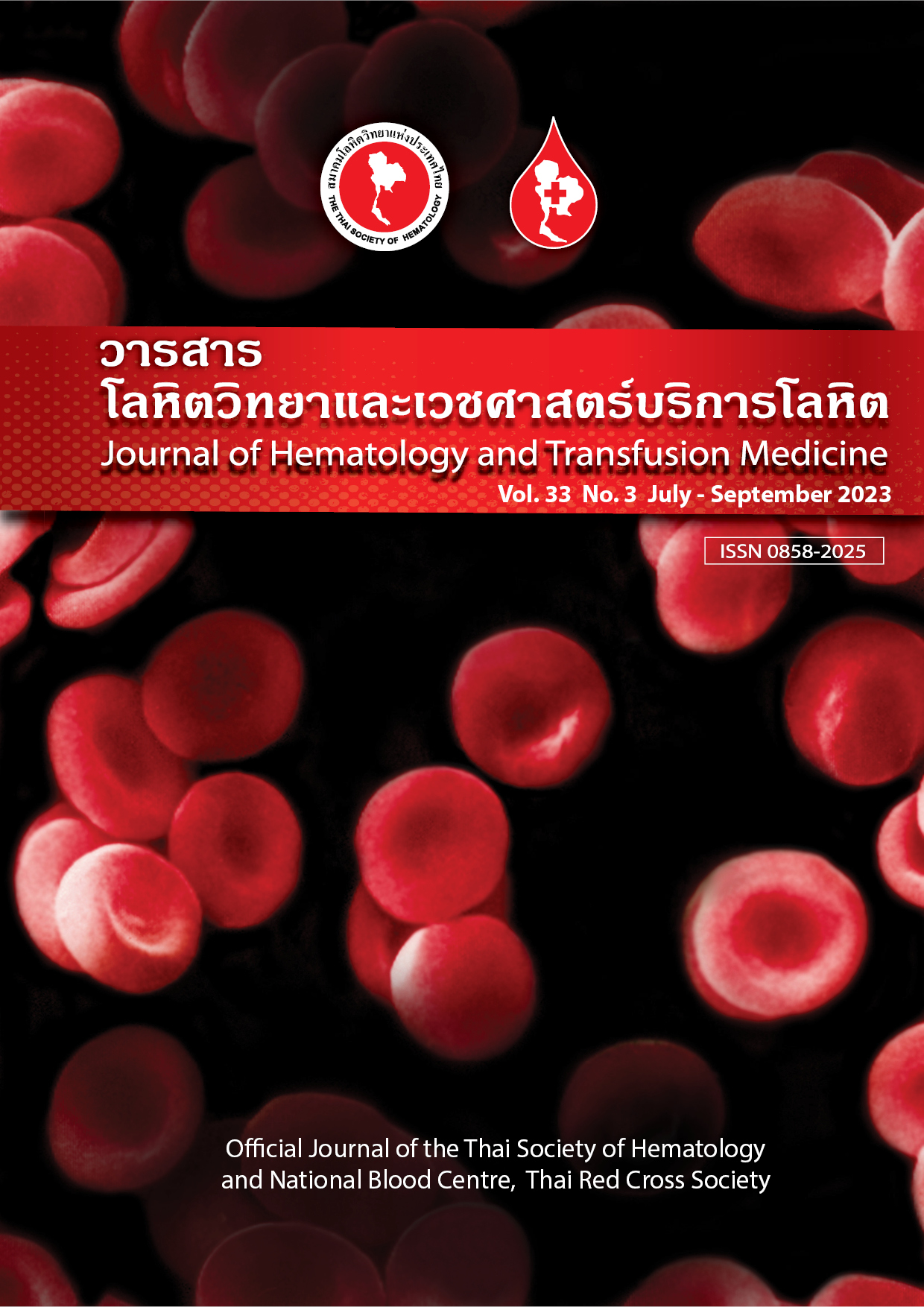Effectiveness of oral acyclovir three times a week regimen for viral prophylaxis among patients receiving bone marrow transplant
Keywords:
Acyclovir, Viral prophylaxis , HSV infection , HSV or VZV infection , Acyclovir prophylaxisAbstract
Introduction: Several guidelines have recommended oral acyclovir at 400 to 800 mg twice daily or IV at 250 mg/m² every 12 hours to prevent HSV and VZV postbone marrow transplantation. However, at King Chulalongkorn Memorial Hospital, patients with hematologic malignancy and undergoing bone marrow transplantation have been given 400 mg oral acyclovir regimen three times a day which is commonly used to prevent HSV and VZV. Still, studies have not yet been conducted to demonstrate this regimen’s antiviral efficacy and safety Objective: The study aimed to investigate the incidence of HSV and VZV and safety among patients undergoing bone marrow transplant and receiving acyclovir three times a week. Materials and Methods: A retrospective study was conducted for adult patients aged 18 years and over receiving a bone marrow transplantation at King Chulalongkorn Memorial Hospital, Thai Red Cross Society between 1 January 2017 and 31 December 2020. General patient data information related to bone marrow transplantation, information on exposure to acyclovir, history of viral infection and adverse reactions were collected. Results: Data were collected from 98 patients receiving bone marrow transplant. Two patients (2%) were found with HSV. The average days of presenting HSV after receiving bone marrow transplantation was 235.5 days. No severe adverse reaction related to acyclovir were observed. Conclusions: Using a 400 mg oral acyclovir regimen three times a day, thrice a week benefitted patients receiving bone marrow transplantation. The incidence of HSV did not differ from the standard regimen with no serious adverse events.
Downloads
References
Iida M, Kodera Y, Dodds A, Ho AYL, Nivison-Smith I, Akter MR, et al. Advances in hematopoietic stem cell transplantation in the Asia-Pacific region: the second report from APBMT 2005-2015. Bone Marrow Transplant. 2019 Dec;54 :1973-1986.
Elfenbein GJ, Saral R. Infectious disease during immune recovery after bone marrow transplantation. In: Allen JC, editor. Infection and the compromised host. Baltimore: Williams & Wilkins; 1981. p. 157–196
Koc Y, Miller KB, Schenkein DP, Griffith J, Akhtar M, DesJardin J, et al. Varicella zoster virus infections following allogeneic bone marrow transplantation: frequency, risk factors, and clinical outcome. Biol Blood Marrow Transplant. 2000;6 :44-9.
Erard V, Guthrie KA, Varley C, Heugel J, Wald A, Flowers ME, et al. One-year acyclovir prophylaxis for preventing varicella-zoster virus disease after hematopoietic cell transplantation: no evidence of rebound varicella-zoster virus disease after drug discontinuation. Blood. 2007 Oct 15;110 :3071-7.
Boeckh M, Kim HW, Flowers ME, Meyers JD, Bowden RA. Long-term acyclovir for prevention of varicella zoster virus disease after allogeneic hematopoietic cell transplantation--a randomized double-blind placebo-controlled study. Blood. 2006 Mar 1;107 :1800-5.
Erard V, Wald A, Corey L, Leisenring WM, Boeckh M. Use of long-term suppressive acyclovir after hematopoietic stem-cell transplantation: impact on herpes simplex virus (HSV) disease and drug-resistant HSV disease. J Infect Dis. 2007 Jul 15;196 :266-70.
Kawamura K, Wada H, Yamasaki R, Ishihara Y, Sakamoto K, Ashizawa M, et al. Low-dose acyclovir prophylaxis for the prevention of herpes simplex virus disease after allogeneic hematopoietic stem cell transplantation. Transpl Infect Dis. 2013 Oct;15 :457-65.
Gluckman E, Lotsberg J, Devergie A, Zhao XM, Melo R, Gomez-Morales M, et al. Oral acyclovir prophylactic treatment of herpes simplex infection after bone marrow transplantation. J Antimicrob Chemother. 1983 Sep;12 Suppl B:161-7.
National Comprehensive Cancer Network. prevention and treatment of cancer-related infections (version 3.2022). https://www.nccn.org/professionals/physician_gls/pdf/infections.pdf
Fei N, Shah N, Cumpston A, Wen S, Ross KG, Craig M, Kanate AS. Low-Dose Acyclovir Prophylaxis for Varicella zoster Reactivation in Autologous Hematopoietic Cell Transplantation Recipients. Clin Hematol Int. 2019 Jun 11;1(2):101-104.
Kawamura K, Hayakawa J, Akahoshi Y, Harada N, Nakano H, Kameda K, Ugai T, Wada H, et al. Low-dose acyclovir prophylaxis for the prevention of herpes simplex virus and varicella zoster virus diseases after autologous hematopoietic stem cell transplantation. Int J Hematol. 2015 Aug;102(2):230-7.
Kanda Y, Mineishi S, Saito T, Saito A, Yamada S, Ohnishi M, Chizuka A, et al. Long-term low-dose acyclovir against varicella-zoster virus reactivation after allogeneic hematopoietic stem cell transplantation. Bone Marrow Transplant. 2001 Oct;28(7):689-92.
Asano-Mori Y, Kanda Y, Oshima K, Kako S, Shinohara A, Nakasone H, Sato H, et al. Long-term ultra-low-dose acyclovir against varicella-zoster virus reactivation after allogeneic hematopoietic stem cell transplantation. Am J Hematol. 2008 Jun;83(6):472-6.
Lam NN, Weir MA, Yao Z, Blake PG, Beyea MM, Gomes T, Gandhi S, et al. Risk of acute kidney injury from oral acyclovir: a population-based study. Am J Kidney Dis. 2013 May;61(5):723-9.
Al-Alawi AM, Al-Maqbali JS, Al-Adawi M, Al-Jabri A, Falhammar H. Incidence, patterns, risk factors and clinical outcomes of intravenous acyclovir induced nephrotoxicity. Saudi Pharm J. 2022 Jun;30(6):874-877.
Lee EJ, Jang HN, Cho HS, Bae E, Lee TW, Chang SH, Park DJ. The incidence, risk factors, and clinical outcomes of acute kidney injury (staged using the RIFLE classification) associated with intravenous acyclovir administration. Ren Fail. 2018 Nov;40(1):687-692.
Downloads
Published
Issue
Section
License
Copyright (c) 2023 Journal of Hematology and Transfusion Medicine

This work is licensed under a Creative Commons Attribution-NonCommercial-NoDerivatives 4.0 International License.



